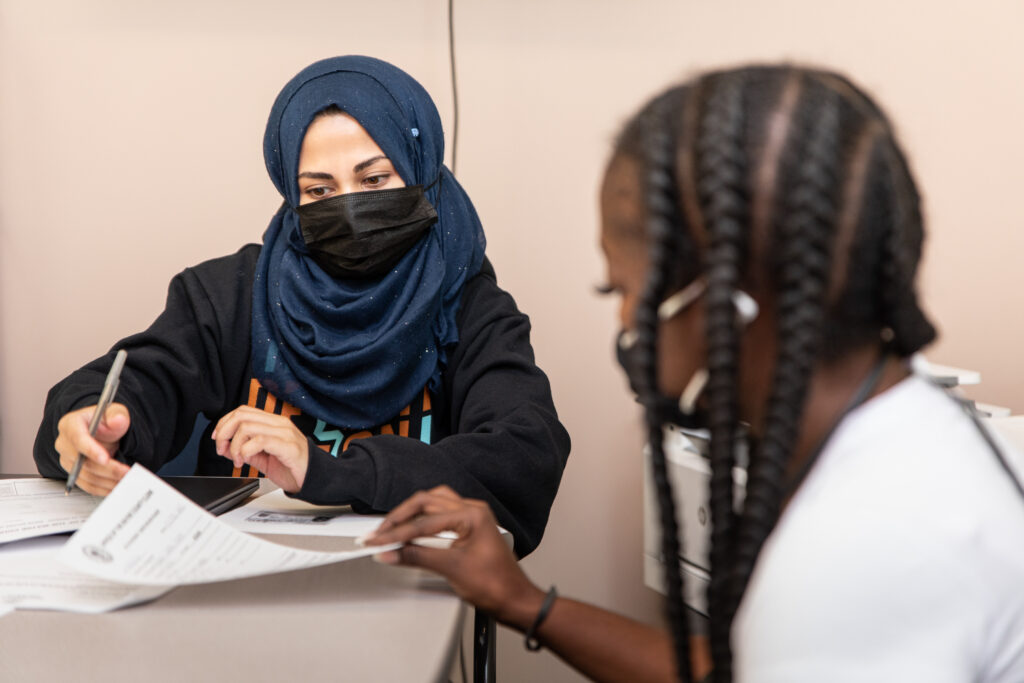By Veronica Vargas

More than 110,000 people in the United States died from overdose in 2022, and mortality rates are now highest in Black and Indigenous communities. Despite these racial disparities, many harm reduction organizations, health care providers and social services are not reaching or adequately engaging people of color who are using drugs.
Creating meaningful change goes beyond stating that racial justice is a priority: Change requires action, commitment and re-examining practices that uphold white supremacy culture. To reduce overdose deaths and address health disparities, harm reduction organizations and health care providers must center their work around racial justice. As momentum builds for a health-based approach to drug use, it is important to equip organizations that work with people who use drugs to address how Black, Indigenous and other people of color experience the collateral consequences of drug use. This includes mass incarceration and surveillance, loss of eligibility for public housing and public assistance, poor access to treatment medications—including methadone and buprenorphine—and punitive policies and practices related to child welfare, parole and probation.
A new, free online racial equity course, “Taking Action on Racial Equity in Drug User Health Programs,” is now available to equip participants with practical steps they can take to center racial justice on a personal, organizational and community level. Vital Strategies’ Overdose Prevention Program collaborated with In the Works, which provides harm reduction e-learning, and Reframe Health and Justice Consulting to develop the course, designed for organizations that work with people who use drugs.
The Vital Strategies Overdose Prevention Program, launched in 2018, has worked across seven states to establish and scale effective policy and program models to reduce overdose deaths in these jurisdictions. Across different sectors—including civic groups, grassroots organizations, professional associations, and local and state governments—there remains an urgent need to incorporate racial equity principles into ongoing projects to mount a health-based response to drug use. Recognizing the lack of guidance tools that address the intersection of racial equity and harm reduction, Vital Strategies sought partners to develop better approaches in reducing overdose deaths by incorporating racial equity within harm reduction strategies and training.
The free e-course is geared towards people who are involved in direct service, such as health providers and community organizers who want to incorporate racial equity in their work to better serve and support people of color who use drugs. Any organization, regardless of where they are in terms of addressing equity concerns, can benefit from enrolling in this transformative course.
“Taking Action on Racial Equity in Drug User Health Programs” features lessons from people of color who work in overdose prevention, as well as harm reduction organizations led by people of color. The e-course consists of three main modules:
- Racial Equity in Overdose and Drug User Health
- Addressing Institutional Racism within Organizations
- Racial Equity in Planning, Data and Action
The first module, “Racial Equity in Overdose and Drug User Health,” provides participants with an overview of racial inequities in overdose deaths, and the history of racial criminalization and of systemic racism faced by people who use drugs. This module introduces participants to adoptable racial justice approaches to overdose prevention.
In the second module, “Addressing Institutional Racism within Organizations,” participants are introduced to actionable ways in which they can center racial equity within their organization. It includes lessons on how to support racial justice operationally within an organization through hiring and retaining a multi-racial team, ongoing racial equity training, and how to create a workplace where people understand the effects of trauma.
The third module, “Racial Equity in Planning, Data and Action,” focuses on developing partnerships and identifying goals that will advance racial equity within organizations, and best practices for using data and evaluation to identify racial disparities.
The course includes access to downloadable handouts and worksheets with module summaries, reflection questions, and practical tools that organizations can use to reinforce racial equity principles in their work. Participants will gain skills to apply evidence-based strategies to address institutional racism within their organizations, build coalitions that advance racial justice, and better serve communities of color.
In total, “Taking Action on Racial Equity in Drug User Health Programs” includes 23 lessons and is estimated to take around six hours to complete. Participants can go at their own pace as they explore the modules, and will receive a certificate of completion.
To register for this free training on In The Work’s website, click here.
Veronica Vargas is a Program Manager with the Overdose Prevention Program at Vital Strategies.
About Vital Strategies’ Overdose Prevention Program
Vital’s Overdose Prevention Program works to strengthen and scale evidence-based, data-driven policies and interventions to create equitable and sustainable reductions in overdose deaths. Work across seven U.S. states is supported by funding from the Bloomberg Philanthropies Overdose Prevention Initiative, launched in 2018, and by targeted investments from other partners. Learn more here.